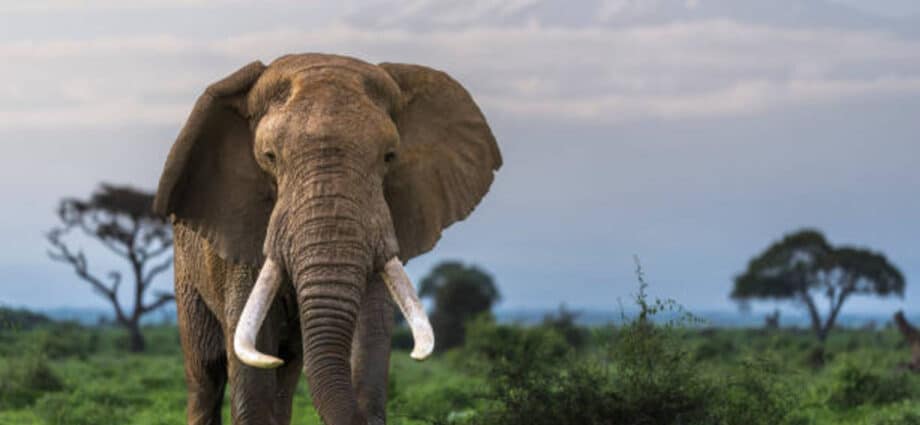Tanzania is doing the wildlife equivalent of eating neighbour Kenya’s children. And Namibia and Zimbabwe are both doing something right with their wildlife, but that is wrong at the same time.
For 50 years, trophy hunting has been banned in Kenya. However, it is permitted in Tanzania, after a ban was lifted six years ago. But there is the political question of the Kenya-Tanzania border. The Amboseli National Park and ranges span about 30,000 square kilometres across Kenya and Tanzania and are home to more than 2,000 elephants.
There are no wildlife IDs or passports, and wildlife are great East African integrationists so they go back and forth freely. In that spirit, Kenyan elephants went to hang out, as they have done for ages, on the Tanzanian side. At least five bulls from a Kenyan wildlife reserve are reported to have been shot and killed in Tanzania by hunters in recent months. Some of them were super tuskers; elephants with massive tusks. Wildlife scientists say they are among the last gene pools for large tusks, so allowing them to be killed could potentially wipe out their genetic line.
Kenyan and international conservationists are very upset about it all. And, as someone remarked, it is akin to eating a neighbour’s child who crossed the fence to play with your children — who are her friends.
It is a tough time to be an elephant — and hippopotamus — especially in southern Africa, which is experiencing the region’s worst drought in nearly 100 years. In early September, the Namibian government announced plans to slaughter 83 elephants and 640 other wild animals to feed some of its 1.4 million people, about half of the country’s population, who are facing severe food insecurity.
Hunting wild animals
Before the storm over the Namibian slaughter calmed down, not too far up the road, on Tuesday, Zimbabwe announced that it plans to kill 200 elephants to feed people facing acute hunger. This could be very bad because the situation in both Namibia and Zimbabwe is expected to get worse over the next one to two months.
Conservationists have denounced these actions, and some economists have argued that it is not sustainable. Within weeks, all the elephants in the two countries could be eaten, then what?
But there are many supporters too. Religious people are quoting the Bible where, in Genesis, the good Lord says “Everything that moves, everything that is alive, is yours for food. Earlier I gave you the green plants, but now I give you everything for food”.
Supporters also say that because their pasture and water have dried out considerably, the animals are going to die anyway, so slaughtering them is mercy killing, and doing something noble with their flesh rather than just leaving it to rot and be eaten by vultures.
From a pragmatic point of view, this is sensible. However, it says something troubling about us. We cannot, surely, in 2024, with all the progress we have made and great leaps of science available to us, be hunting wild animals like our forefathers and mothers 300 years ago in times of a climate and food crisis.
Find creative solutions
Additionally, the timing couldn’t have come at a worse time. Tanzanian wildlife hunts and the Namibian and Zimbabwe culls have something in common. Often, the animals that are considered legitimate to kill in hunts are the “useless” ones; older males deemed unable to sire quality offspring anymore, female ones that cannot breed, and those too weak to hunt. They are extra baggage.
This is the same logic that drives witch hunts, common in countries like Tanzania, where in times of famine or drought, older people have been accused of being witches who are keeping the rain away or cursing the harvest, and killed. In the Democratic Republic of Congo, children are denounced as “demons” and eliminated. The real purpose of these witch hunts is to remove from the table the mouths communities think are not contributing enough in times of scarcity and to seize their land and gardens for those considered more deserving. It is fascism at the worst.
If governments didn’t think about these problems like we were still living in caves, they would find creative solutions. Some could be as simple as creating online and offline trades for wildlife. How much is the value of a fully-grown elephant? In 2019, elephants were sold to overseas countries for between $13,500 and $41,500 each. In an open auction, they would have brought in more.
Put all the elephants destined for slaughter up for auction, but one can pay the price in food, water equipment, or even funding their relocation to places that aren’t hit by drought. In today’s environment, the auction would bring enough money, food and water infrastructure to enable communities and wildlife to weather this rough patch. Then, ensure that the politicians don’t steal it all for themselves.
In the end, it’s about governance, stupid!
The author is a journalist, writer, and curator of the “Wall of Great Africans”. Twitter@cobbo3















